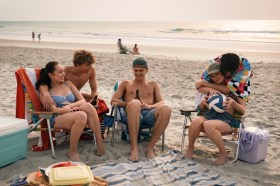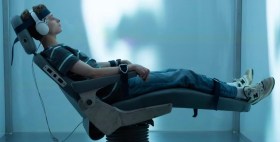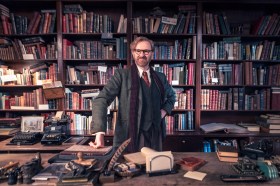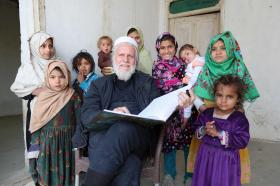With 2010’s Monsters, Gareth Edwards made the thinking man’s creature feature – in the context of the poor slate of recent titles (not the entire lifespan of the genre). His serious and understated love story set in the shadows of large, lumbering interlopers understood the need not only for formidable foes towering above, but also for intellectual and emotional context to the carnage. With societal commentary in abundance, his tale belonged to people navigating a ravaged environment more than it did to the titular menace.
Accordingly, it was with much fanfare that Edwards ascended the filmmaking ladder from his indie debut to one of the most famous film franchises in history. Godzilla appears an apt and easy fit for the British director, his cognizance of the fragile balance between contemplative human drama and awe-inspiring visual spectacle a welcome addition to the latest American version of the Japanese classic. With the horrendous 1998 effort still lingering in memory, Edwards’ willingness to observe rather than sensationalise is key to his fresh interpretation of the beloved beast. These expected elements can be found in his take on the daikaiju, albeit with more focus on the monsters and less on the men in their midst.
In the Philippines circa 1999, scientists Dr. Ichiro Serizawa (Ken Watanabe, Inception) and Vivienne Graham (Sally Hawkins, The Double) survey a new discovery: a fossilized skeleton beyond the scope of anything ever seen, complete with an obvious escape trail for an unidentified – but clearly sizeable – creature. In Japan, nuclear power plant engineer Joe Brody (Bryan Cranston, TV’s Breaking Bad) raises alarm about tremors and echoes threatening the facility, but tragedy strikes before anyone accepts his concerns. Fifteen years later, Joe remains committed to piecing together his theories about the accident that changed his life, with his soldier son Ford (Aaron Taylor-Johnson, Kick-Ass 2) tasked with tempering his obsession. What starts as an act of intervention becomes one of collaboration when the rumbles from the deep resurface.
Given the film’s title, the source of trouble is far from a secret, in an effort that proves one part background, one part battle, all parts behemoth. Yet Godzilla is also a mystery, quivering with the tension of teasing out its monstrous centrepiece one low-angled point-of-view shot at a time. Edwards knows the value of doling out information in measured doses, offering glimpses of the eponymous organism and its equally enormous adversaries before the big reveal. His slow-burn approach also illustrates his penchant for patience; though the slightest of drag afflicts the feature’s first half, the pay-off is well worth the anticipation-fuelled waiting.
Staying true to the filmmaker’s form, Godzilla weaves a delicate – though almost overdone – dissection of mourning and mankind’s futility against nature in the clash of the titans. Joe and Ford lament their personal losses, with Ford endeavouring to stave off more as he attempts to find his way back to his wife, Elle (Elizabeth Olsen, Oldboy), and son, Sam (Carson Bolde), in San Francisco. Ichiro and Vivienne show their grief for the weapons-over-words tactics employed to tame the danger, as personified by the military chief (David Strathairn, Lincoln) making all the decisions. Nuance is lacking, both in individual subplots and in the accompanying performances, but there is ample and earnest urgency. The combination of suspense and subtlety is reserved for the true star of the show – Gojira, as Ichiro exclaims.
There’s reverence and respect in the film’s treatment of its main attraction, as well as a lengthy appreciation for the character’s history, even to the extent of overemphasising explanatory information. Dave Callaham’s (The Expendables) story and Max Borenstein’s (the forthcoming Seventh Son) screenplay shows their love for everything Godzilla represents: the metaphor for nuclear conflict, the demonstration of the compulsion to unfairly malign what cannot be easily understood, and the depiction of perhaps the biggest-scale unlikely hero. Retro-fitted narrative revisions restyle the scenario beyond the snippets of footage seen in the opening credits, but any changes to the Godzilla canon are made to suit a contemporary setting.
Elsewhere, amendments include the embrace of Edwards’ distinctive style of relatable perspectives, not to mention the ever-bleak colour scheme; however the film is at its best in its jaw-dropping imagery. Set to the terse sounds of master composer Alexandre Desplat’s (The Grand Budapest Hotel) score, the visuals soar literally through the clouds and figuratively through quiet contemplation and physical devastation, the hulking, reptilian-like beings and their wave a sight to be seen. For its 60th birthday, Godzilla, the character, roars through the frame with power and also poignancy; Godzilla, the film, relishes the dichotomy of solemnity and spectacle. As it thrashes and splashes towards its fulfilling finale, the end result is thoughtful and forceful, as befitting a modern monster movie of its pedigree.
Rating: 3 ½ out of 5 stars
Godzilla
Director: Gareth Edwards
US / Japan, 2014, 123 minutes
Release date: May 15, 2014
Distributor: Roadshow
Rating: M
Actors:
Director:
Format:
Country:
Release:





